As we begin our hunt for the marine worms, there is a group of three extraordinary people that are assisting our diving operations. Without them, we could not be successful in the field with our diving. Each of them is an incredible diver and an even better person. We are so lucky to have them as part of the expedition (and I am especially lucky to be learning so much from them). Here's a little bit about the United States Antarctic Program divers.
Dr. Brenda Konar
Job at McMurdo Station: Diver
Job in the real world: Professor at University of Alaska at Fairbanks
Seasons in Antarctica: 3 as scientist and 3 as Raytheon diver
Where do you live now?
Fairbanks, Alaska
 Dr. Brenda Konar, University of Alaska college professor and Diver Extraordinaire.
Dr. Brenda Konar, University of Alaska college professor and Diver Extraordinaire.
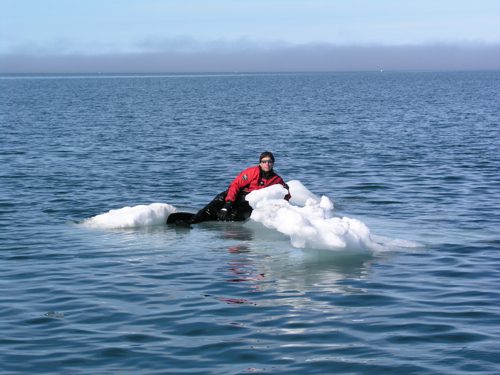 Lounging on the ice.
Lounging on the ice.
Background
I grew up on the coast of California. Did my Masters at the Moss Landing Marine Labs and my PhD at UC Santa Cruz. I am a nearshore ecologist by trade but I often specialize in algae (i.e.kelp forests). My research involves everything from looking at impacts of sea otters on nearshore habitats in Alaska, to looking at kelp/boulder communities in the Beaufort Sea on the North Slope of Alaska, to examining epibenthic communities in the Chukchi Sea...
How did you get into diving?
When I was an undergraduate a lot of my friends were into diving. They talked me into getting certified. I decided I liked it so when I graduated from college with my degree in Zoology (what does one do with a undergraduate degree in Zoology??), I decided to go for a masters in Marine Biology and concentrate on kelp forests.
Favorite Antarctic diving moment or location?
I like a place called Little Razorback. There are always lots of Weddell seals there, which are fun to listen to and see. The change in water depth is pretty dramatic so you can see lots of critters at different depths. In the shallow areas, the caves and caverns caused by the ice uplifting around the island are very cool and fun to swim around.
Favorite organism you've seen under the ice?
I love the Weddell seals and the jellyfish. The seals make a lot of noise and you can watch them change their posture with the noises they make. They are also extremely graceful underwater and make me feel like I'm extremely ungraceful. I also like the jellies, because jellies are the most elegant, magical, and vulnerable creatures in the water (my opinion)... any water.
Would you recommend your job to students?
Heck yes! Between McMurdo diving and the diving (and other things) I do in Alaska, my life is fun.
Any advice for students who are interested in diving or working in Antarctica?
The advice is different depending if they want to be a commercial diver versus a scientific diver (or some weird combination). I will let Rob and Steve talk about the commercial end. Since I am a scientific diver, I will give advice for the student interested in scientific diving. I would recommend that students get involved with the Marine Biology Programs at local universities. Get to know the professors who work in research areas that interest them. Do a google search to find these researchers. Seek those people out for advice, a job, volunteering, etc. Persistence and hard work pays off. Good timing is helpful too. You never know when a researcher needs a new helper or graduate student...
Steve Rupp
Position/Title: Supervisor of Dive Services. Raytheon Polar Services
Seasons in Antarctica:12
Where do you live now?
Englewood, Colorado
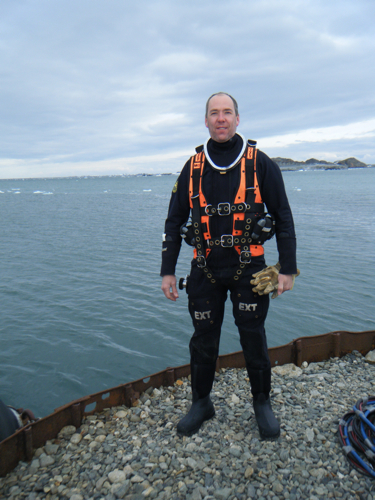 Steve Rupp. USAP Dive Services Supervisor and Diving Swami.
Steve Rupp. USAP Dive Services Supervisor and Diving Swami.
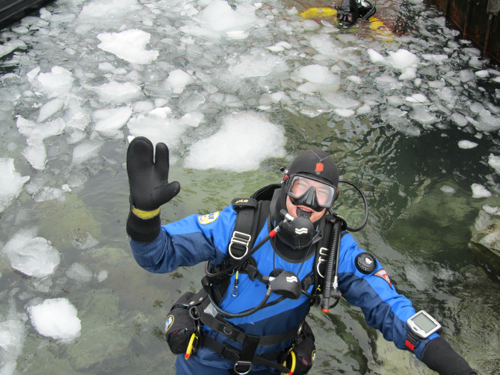 Steve Rupp. You can see the smile even under all that gear.
Steve Rupp. You can see the smile even under all that gear.
Background
Grew up in Aurora, Colorado and decided when I was in 7th grade that I wanted to become a commercial diver. My dad was a pilot so I figured I would be a rebel and go the other direction. Took welding and mechanical courses in high school and also got SCUBA certified. Once out of high school, I went to a commercial dive school in California and then on to Scotland to get certified to work in the North Sea.
How did you get into diving?
I think it was all of the cool dive gear that got me interested originally and of course Jacques Cousteau on TV. It was kind of tough getting into diving in Colorado.
Favorite Antarctic diving moment or location?
There are so many....
- Diving out at Cape Washington with the Emperor Penguins and the BBC guys.
- Free falling from the dive hole down to the seabed in crystal clear water like a slow motion skydiver.
- Cape Evans wall and swimming over to the glacier wall that drops down beyond where you can see or go.
- Diving through the ice cracks with Weddell seals and their pups all around.
- I still love underwater welding which we get to do about 1 month every year at Palmer Station.
Favorite organism you've seen under the ice?
I really think the Ctenaphores are really cool looking. Translucent barrel shaped Jellies who's propulsion tines look like a little light show when you shine your dive light on them. The sea spiders are pretty cool looking as well. Penguins and seals swimming underwater are pretty amazing!
Would you recommend your job to students?
Maybe. It's a great job but definitely not for everyone. Lots of travel far away from home. tough getting started/established in the business. Lot's of time being cold. The pay is ok depending on what type of diving you get into. It can be trying on relationships. On the plus side, you are not stuck in some stuffy office and you get to see and do some really cool stuff. (pun intended)
Any advice for students who are interested in diving or working in Antarctica?
Don't do drugs. Stay in school... Listen to your teachers (especially Michael). Seriously, the easiest and best way to get down to Antarctica as a diver is as a scientific grantee. To get down here with some other type of job is well worth the experience, at least once, even if it's low paying. It's one of the last truly wild places on earth!
Rob Robbins
Position/Title: Dive Services Supervisor, U.S. Antarctic Program
Seasons in Antarctica: 34
Where do you live now?
Denver, Colorado
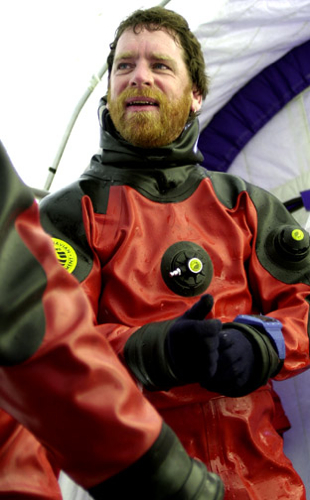 Rob Robbins. USAP Dive Services Supervisor and Diving Guru.
Rob Robbins. USAP Dive Services Supervisor and Diving Guru.
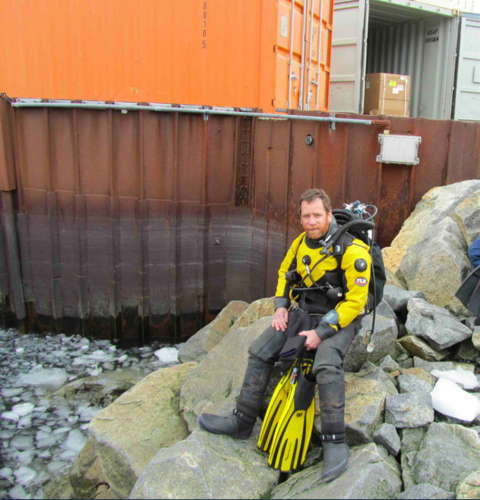 Rob Robbins, hard at work at Palmer Station, Antarctica.
Rob Robbins, hard at work at Palmer Station, Antarctica.
Background
I grew up in the small town of Murphy, OR outside of Grants Pass in southern Oregon. I worked on Johnston Island in the mid-Pacific, went to school in Florida, worked in the Gulf of Mexico as a diver in the oil fields and have worked in Antarctica for the past 34 years.
How did you get into diving?
Watching Sea Hunt and Jacques Cousteau on TV as a child, I just knew I wanted to be a diver when I grew up. I started diving recreationally when I worked on Johnston Island as a life guard for three years. I went to school at Florida Institute of Technology to study diving and then started working as a commercial diver in the Gulf of Mexico and Antarctica. Soon I was running both the commercial and science diving operations for USAP.
Favorite Antarctic diving moment or location?
Favorite Moments: I love being in the water pretty much every dive, but sharing a great dive with people who have become my close friends in Antarctica is my favorite part of the diving here. Favorite Location: Many are good but Granite Harbor, Cape Evans Wall and Turtle Rock are really special dive sites.
Favorite organism you've seen under the ice?
This has to be diving with Orcas at the ice edge or seeing the huge soft coral Gersemia antarctica for the first time at Cape Evans Wall.
Would you recommend your job to students?
I have the best job in the world so of course I would recommend it. Diving as a career is hard though, it takes a lot of perseverance to get jobs over other qualified applicants. The payoff is amazing when it happens.
Any advice for students who are interested in diving or working in Antarctica?
Like anything else you really want, if you want to dive in Antarctica, you have to focus your energy on studying pertinent topics and learning the skills needed to accomplish work underwater. You need spend as much time as you can honing your skills so that you excel over other people. You have to be persistent in seeking a job. When you get the job you have to work hard and be willing to help in all aspects of the project. You also have to be a good member of the team, both professionally and socially, so that you are valued as someone with whom other people want to work. If you set your mind to it and work hard, you can do it. Good luck.

